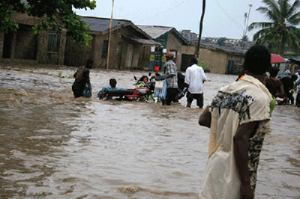Going by global climate history and the forecast by the Nigerian Meteorological Agency (NIMET), it is almost certain that the rains are set to resume full turtle for the months of July, August and September. The advent of the raining season every year is always greeted with great enthusiasm, particularly by farmers. This usually marks the prelude to the farming season and prospects of bumper harvest of agricultural produce around the country.

However, the hope of bumper harvests by farmers is sometimes dashed by flood which over the years has hampered the efforts of government and farmers to improve on agricultural production, thereby, resulting in serious economic hardship in the country. The unabated rainfall, construction works, dumping of refuse on natural water ways, blockage of canals, leakage from dams, lakes, overflow of rivers and streams have all been identified as catalysts to flood and flooding.
In 2012, Nigeria experienced the worst menace of flood in recent years due to excessive rainfall aggravated by the release of water from a Cameroonian dam by the authorities of that country which flowed into Rivers Benue and Niger, causing uncontrollable flooding. The flood destroyed many homes, farmlands, and threatened the supply of agricultural products in the country.
The terrible and pathetic conditions inflicted on the people especially from the frontline states of Taraba, Benue, Kogi, Anambra, Rivers and Bayelsa among others remain indelible in the minds of Nigerians.
The washing away of homes, farmlands and the resultant loss of hundreds of lives remain a serious concern to government. Now that the raining season is getting to a climax, the question on the lips of many are whether the country will yet again be confronted with a repeat of the 2012 experience, and what the Federal Government has done or is doing to avoid a repeat experience of the 2012 flood.
On its part, the Government of President Goodluck Jonathan has equipped NIMET and put it in a position to ensure accurate weather forecast in order to alert the public on imminent dangers of flooding.
Besides, the Federal Government released the whooping sum of N17 billion to states affected by the flood and other relevant stakeholders to help mitigate the devastating consequences that characterised the 2012 experience.
Also, the construction of the Kashimbilla/gamovo multipurpose, Ose Dam and Hydropower project in Taraba State to accommodate the excessive flow of water from Cameroon whenever it occurs are among measures government has put in place to avert a reoccurrence of the 2012 flooding.
The dam will not only curtail flood but will also generate electricity, enhance irrigation, create employment and boast agricultural production as well as contribute its quota to self-sufficiency in food production in Nigeria.
Similarly, the Federal Ministry of Environment under the leadership of Mrs. Laurentia Laraba Mallam has installed 307 web-based flood warning systems nationwide. It has also installed community-based flood early warning systems in Ondo, Niger, Cross River, Imo, Anambra, Lagos, Oyo, Osun, Ogun, Nasarawa, Rivers, Kwara, Akwa-Ibom, Abia and Enugu states. The ministry has also acquired and installed four stand-alone automated functional flood early warning facilities along rivers Alamutu, Eruwa and Owena river Basins.
Mallam, is intensifying the campaign for a CLEAN NIGERIA in all the 36 states of the Federation, including the Federal Capital Territory. On the 12th July 2014, the minister was in Lokoja, the Kogi State capital, to lead the National Sanitation campaign, alongside the Governor of that state, Captain Idris Wada.
Massive environmental campaign messages are expected to hit the airwaves including Radio Nigeria in the coming days and months in order to galvanise all efforts aimed at averting possible flooding in 2014 and ensuring a clean and healthy environment for sustainable development.
By Ben Goomg (Federal Ministry of Environment)
